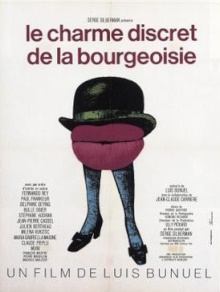If the last couple of films by Luis Buñuel have been less surreal than usual, this one more than makes up for it. It’s less a film than a series of vignettes about a group of friends who keep trying to sit down for a meal yet fail for increasingly ridiculous reasons. This counts as black humor but instead of laughing, you’d probably be wincing instead. The critique against the bourgeoisie is well observed and I love how Buñuel was seemingly inspired by a simple story of friends showing up unexpectedly. It’s a little too silly for me to care much about however and I’m not sure I even want to spend the brainpower to figure out what some of the weirder stories even mean.
A group of friends including Don Rafael Acosta, the ambassador of the fictional South American nation of Miranda, arrive at the house of he Sénéchal for a dinner party. However the wife isn’t expecting them and explains that her husband isn’t even home. The group goes to a nearby inn instead that has to be unlocked by a waitress. They sit down at a table only to find that the inn is actually holding a wake for the owner who died earlier that day and so quickly leave. This pattern repeats over and over again as the group’s attempts to eat are frustrated by increasingly ridiculous interruptions. Even when the women go to the cafe, the waiter is unable to bring them anything except water. Meanwhile all kinds of other crazy events happen, including Acosta being fearful of assassins, a bishop comes to the Sénéchal house looking for work as a gardener, stories of murder, revenge and ghosts, many of which turn out to be dreams the characters are having.
The whole film consists of digs against the self-important bourgeois rich with their sense of entitlement and hypocrisy without any real plot serving as connective tissue tying the elements together. I like how they get upset when they fail to receive their food as expected but they never fail to maintain proper decorum and dress fashionably. Behind the manners and veneer of civilization however, the group of friends are actually criminals who exploit Acosta’s status as an ambassador to smuggle drugs into France. Little jokes like how they completely change their attitude when the same person appears dressed as a priest or as a gardener before them are easy to understand too and perhaps too on the nose. I suppose scenes like Acosta being confronted by specifically Marxist terrorists represent their fears and I believe the director’s own fantasies of how these rich people deserve to be treated.
There’s more than a bit of whimsy in this and indeed some of the dream sequences seemed to be Buñuel’s own recurring dreams without any connection to the characters or the larger theme. I found this amusing and entertaining and I guess that will have to be enough because I don’t think this is among the director’s best works.
